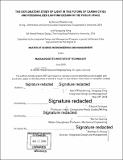The exploratory study of light in the future of caring cities and personalized lighting design in the public space
Author(s)
Phakdurong, Kamin.; Yang, Yangyang,
Download1121596098-MIT.pdf (26.59Mb)
Other Contributors
Massachusetts Institute of Technology. Engineering and Management Program.
System Design and Management Program.
Advisor
Edward Schiappa.
Terms of use
Metadata
Show full item recordAbstract
Light plays a significant role in urbanization throughout human history. And as the number of people living in the cities has already exceeded half of the world's population, people are facing many challenges like poor infrastructure, social problems, etc. To overcome the burgeoning populations, the lighting innovation is necessary. This thesis presents a solution to the challenges of a light and caring city. We present a lighting system that integrates design strategy, system architecture, and product design. The thesis begins with exploratory research at the intersection of the keywords, light and caring city. We discuss six support roles of light in daily life and twenty features of the caring cities from case studies. We dive into issues of wellbeing and work-life balance with the hypothesis that there lies an opportunity to make a meaningful impact with innovative lighting. To get the holistic view of the challenge, primary and secondary research were conducted to understand user needs before developing the design concepts of the lighting product or service. The design iteration uncovered feedback from users and professionals in the lighting industry, revealing valuable insights and a critical puzzle piece that the industry still struggles to answer: how can personalized lighting support citizens' activities in shared spaces? We believe our solution will make a significant impact to people in their daily lives. The thesis develops a 'smart lighting' solution to personalize and support daily activities, as envisioned for futuristic caring cities. Using a co-working space as the concept demonstration, the thesis introduces the Intelligent Connected Lighting System and a five-layer ruleset. This ruleset integrates a human's biological clock, weather effects, shared space occupancy, activities performed, and custom settings made by users. Our system automatically adjusts luminaires to meet user needs in real-time. Also, to support the flexibility of the system, two additional intelligent lamps were designed with installation suggestions.
Description
Thesis: S.M. in Engineering and Management, Massachusetts Institute of Technology, System Design and Management Program, 2018 Page 126 blank. Cataloged from PDF version of thesis. Includes bibliographical references (pages 105-109).
Date issued
2018Department
Massachusetts Institute of Technology. Engineering and Management ProgramPublisher
Massachusetts Institute of Technology
Keywords
Engineering and Management Program., System Design and Management Program.